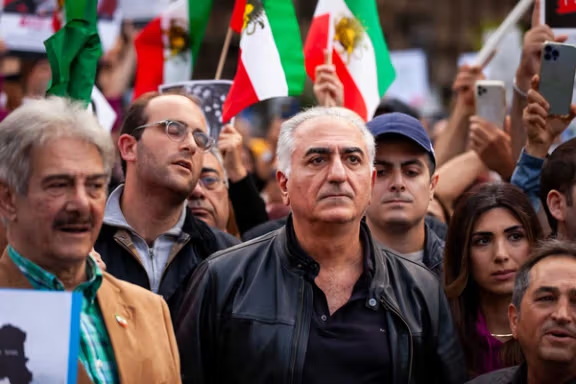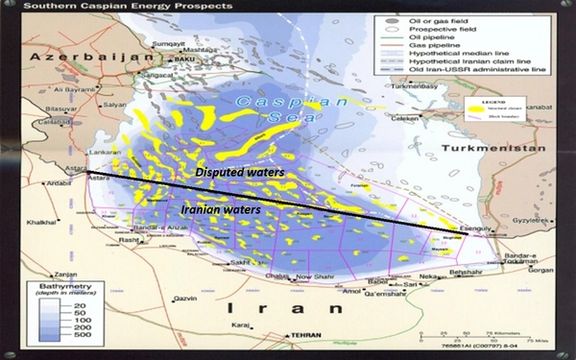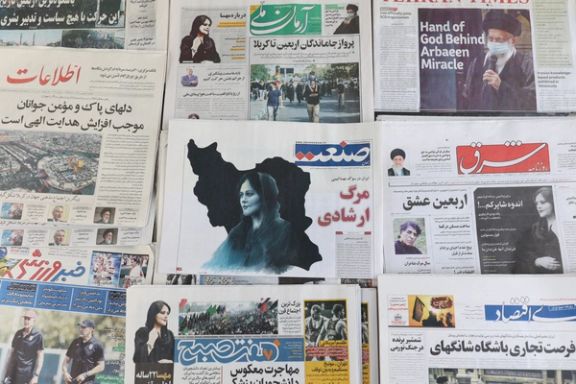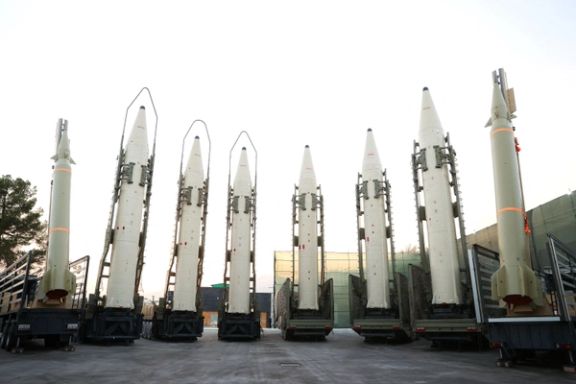Exiled Prince: Young Iranians Seek Regime Change In Iran

Iran’s exiled prince Reza Pahlavi has said that the new generation of Iranians have given up on reforming the clerical regime and see their future in putting an end to the Islamic Republic.

Iran’s exiled prince Reza Pahlavi has said that the new generation of Iranians have given up on reforming the clerical regime and see their future in putting an end to the Islamic Republic.
In an interview with Jewish Journal in late January and published on Thursday, Pahlavi said the new generation is realizing that the root cause of their problems is the Islamic system of government, which cannot be reformed.
Prince Pahlavi, who is a leading figure of opposition to the Islamic Republic, has long maintained that the people of Iran need to decide what form of government should replace the clerical political system in the future, regardless of if they choose monarchy or a republic.
He emphasized on the importance of non-violent methods of struggle against the regime, and insisted that in case of regime change, “80 percent of the government bureaucracy” should continue doing its job.
“I’ve been a student of Gene Sharp and the nonviolent civil disobedience movement, and I know people sometimes say that this regime is merciless. But I say, no. There has to be, at some point, a difference between us and them,” he argued.
The Islamic Republic has intensified its repression since 2017 and specially after the 2022-23 nationwide protests, killing more than 2,000 protesters in 2019 and in the latest round of street demonstrations.
In his interview, Pahlavi also said that if one day he returns to Iran, he will first visit the poorest and most underprivileged regions, such as the southeastern Sistan-Baluchistan province.

Iran is the only littoral state in the Caspian Sea that does not extract oil or gas, unlike Russia, Azerbaijan, and others, which have invested over $160 billion in Caspian fields.
All littoral states, except Iran, are aiming to increase oil and gas production from these fields in 2024. They collectively produced over 1.2 million barrels per day of oil and 50 billion cubic meters per year of gas from these fields in 2023.
BP’s vice president for the Middle East and Caspian communications and external affairs told Iran International that it plans to drill 24 wells in the Azerbaijani section of Caspian Sea in 2024, with one already nearing completion.
Bakhtiyar Aslanbayli added that the BP-led consortium is also preparing to launch a new platform in Azeri-Chirag-Guneshli (ACG) oil block. It also plans to drill a deeper well (4,200 meters) in ACG’s gas layer in late 2024 to start producing the dry gas from this field in the first quarter of 2025.
Iran remains the only Caspian littoral country that does not produce hydrocarbons from the sea. Despite attempts in the past, including seismic research and drilling wells, Iran has faced technical challenges and setbacks. The country's section of the Caspian Sea, with depths of up to 1,000 meters, presents significant technical and financial hurdles for exploration and development.

BP delivered 2 billion cubic meters (bcm) of associated gas from this oil block to Azerbaijan in 2023, but for first time it is preparing to produce dry gas from its deeper layer as well.
BP-led consortiums invested more than $5.1 billion in Azerbaijan’s offshore Shah Deniz gas field and ACG. These fields share more than 95% of the country’s oil and gas production.
French TotalEnergies also inaugurated another offshore gas field, Absheron, for Azerbaijan in July 2023 with initial 1.7 bcm/yr of gas and 12,000 b/d of ultra-light oil, called gas condensate. Azerbaijan’s state-run Socar and TotalEnergies have invested $1 billion in this project and plan to increase investments to quadruple the prodcution level by 2026.
Socar itself drilled 17,000 meters of oil and gas wells in other fields during 2023 as well. Azerbaijan produced 612,000 b/d of oil and 48 bcm of gas in 2023, almost totally from Caspian fields. It has absorbed more than $95 billion foreign investment in its Caspian oil and gas projects during 1996 to 2023.
Ilham Shaban, the director of Baku-based Caspian Oil Research Center told Iran International that Kazakhstan produced 407,000 b/d of oil and 1 bcm of gas from offshore Kashagan field in 2023. Italian Eni, the operator of this field, is preparing to start drilling in offshore Abay block, southwest of Kashagan in 2024.
Eni-led consortium has invested $60 billion in Kashagan, the biggest oil reservoir in Caspian Sea, as of now.
Qatari UCC Holding recently signed an $11 billion contract with Kazakhstan, including the construction of two gas processing plants for Kashagan with a capacity of 3.5 billion cubic meters per year. Additionally, Dragon Oil from the UAE, the only operating company in Turkmenistan’s offshore fields, plans to boost its oil production from Turkmen offshore fields to 100,000 barrels per day by early 2026, having invested around $6 billion in the projects.
Dragon Oil is currently producing 60,000 b/d of oil from Turkmen offshore fields and eyes boosting this volume to 100,000 b/d by early 2026. It has invested about $6 billion in Turkmen offshore oil and gas projects as of now.
In the Russian side of the Caspian, Lukoil has inaugurated Valery Grayfer field in 2023 after operating Korchagin and Filanovsky offshore fields during recent years. It produced about 150,000 bpd of oil in 2023 from Caspian fields and plans to start development of Khazri field in 2024. Lukoil has discovered 11 oil and gas fields in the Russian section of Caspian Sea.

Iran Still Waits
Iran conducted drillings in its shallow waters during the Soviet era and in 1990s without any result.
Iran has carried out seismic tests in 4000 square kilometers of the Caspian Sea at blocks 6,7,8 and 21 from 2003 to 2005, but the research vessel Pejwak caught fire and burned in 2005 and the exploration operations stopped.
After that Iran started to drill three wells in some blocks by its Amir Kabir drilling rig. However, its crane crashed in 2015 and now it is idle in Iranian waters.
After signing the JCPOA nuclear deal in 2014, Iran initiated negotiations with several international companies for Caspian projects, but no concrete results were achieved. With only 0.5 billion barrels of proven and probable reserves in the Caspian Sea, according to the US Energy Information Administration, Iran's upstream activity in the region remains limited. Despite claims of discovering a gas field in 2012, Iran's exploration and development efforts in the deep waters of the Caspian Sea face substantial challenges without foreign investment and expertise.

American cybersecurity company CrowdStrike has issued a warning regarding potential interference by Iranian state-sponsored hackers in the upcoming 2024 US elections.
In its annual report, the renowned cybersecurity firm has predicted that the Islamic Republic, known for its interest in meddling in US political events, may be planning to interfere in the forthcoming elections in the country.
The firm referred to Information Operations by Iran-backed hackers in late October 2020, a few weeks before the last US presidential election, saying that Iranian threat actors conducted varied targeted operations against US entities. “They sent threatening emails to voters, alleging to represent a far-right US political group and directing recipients to vote for a specific candidate.”
According to the report, Iranian threat actors also disseminated a video falsely alleging to show“overseas actors fabricating ballots, implying one particular political party would seek to exploit security vulnerabilities and compromise voting systems.”
The most common malicious activities targeting elections have historically involved information operations including Distributed Denial-of-Service (DDoS) attacks and website defacements — against state and local government entities. This trend is highly likely to continue in 2024.
The report also said that in the second half of 2023, “Iran-nexus adversaries and Middle East hacktivist adversaries were also observed pivoting cyber operations in alignment with kinetic operations stemming from the 2023 Israel-Hamas conflict.”
Although Iranian cyber operations have historically focused on Israel, the number of faketivist personas leveraged against Israeli targets has increased since the onset of the Israel-Hamas conflict.
Earlier in the month, Microsoft also warned that Russia, Iran, and China are likely to plan to influence the upcoming elections in the United States and other countries in 2024.

Gazelle Sharmahd, daughter of a dual-nationality prisoner sentenced to death in Iran, has launched a global campaign dubbed "CutTheRope" to protest against the surg in executions in Iran.
Jamshid Sharmahd, a 68-year-old software developer and California resident, was abducted by Iranian agents during a visit to the United Arab Emirates in 2020 and forcibly taken to Iran. In February 2023, the Iranian judiciary sentenced him to death on charges of endangering national security.
Sharmahd, who holds German and Iranian citizenship, was convicted of heading a pro-monarchist group named Tondar accused of a deadly bombing incident that occurred in 2008 at a religious center in Shiraz, killing 14 and injuring 215 more.
Drawing support from a coalition of families of prisoners, human rights activists, and political figures, the movement against capital punishment in Iran has gained traction globally.
Among the prominent supporters of Sharmehd's campaign are Yasmine Pahlavi, wife of Iran’s exiled Prince Reza Pahlavi, as well as Kylie Moore-Gilbert and Nazanin Zaghari-Ratcliffe, two former political prisoners in Iran.
The campaign encourages individuals to share photos or videos of themselves with the hashtag #CutTheRope as a symbol of protest against executions in Iran.
According to Human Rights Activists News Agency, in 2023 alone, at least 791 citizens, including 25 women and two juvenile offenders, were executed -- a 33 percent increase compared to the previous year. Additionally, reports from Amnesty International revealed that from January 2012 to July 2023, over 5,000 individuals, including 57 children, were executed in Iran.
United Nations Secretary-General António Guterres had previously warned the UN General Assembly about the escalating execution rates in Iran, urging immediate action to address the concerning trend.

UK’s National Union of Journalists (NUJ) demands action against Iran after documents reveal secret trials of journalists working for Persian language media abroad.
The documents, released by the hacker group Edalat-e Ali, have identified 44 journalists and media activists accused by Iran's judiciary of engaging in "propaganda against the Islamic Republic system."
Among those implicated are ten journalists affiliated with BBC Persian in London, along with others associated with Iran International, Manoto TV, Gem TV, Voice of America, and Prague-based Radio Farda (Radio Free Europe/Radio Liberty).
Michelle Stanistreet, General Secretary of the NUJ, strongly condemned Iran's actions, characterizing them as part of an aggressive campaign against Iranian journalists both domestically and internationally.
“It is deeply shocking that a state can act in this abhorrent way, putting journalists and their families in real danger in a flagrant abuse of press freedom. Once again, we will be contacting the UK’s government and the UN and we ask that the wider international community speak out against this outrageous weaponizing of journalists,” she added,
The revelation came following the publication of a database of criminal cases from the Tehran Judiciary by Edalat-e Ali, which included details of both public and secret cases totaling three million in number. The affected journalists were reportedly unaware of their conviction until the hacked documents were made public, revealing that they had been tried in absentia without legal representation or access to the indictment.
Following the disclosure of the documents, Iran's notorious Judiciary initially denied any hacking of its computer systems. However, all the files are accessible to the public on Telegram.

Iran will face a “swift and severe” response if it sells ballistic missiles to Russia, the United States warned on Thursday, reacting to reports earlier that Tehran may have done so.
Reuters reported Wednesday that Iran has provided Russia with hundreds of surface-to-surface ballistic missiles, adding to the large number of Iran-made drones and guided bombs and artillery ammunition –all of which has been used against Ukraine.
US National Security Council spokesman John Kirby said Thursday that the Biden administration will impose more sanctions on Iran for supplying drones to Russia, and it would go even “further” if it’s established that Iran has given Russia ballistic missiles, implying that the US government is yet to see clear evidence of that.
“We will implement additional sanctions against Iran and we will coordinate further response options with our allies and partners in Europe and elsewhere,” Kirby said. “I can assure you that the response from the international community will be swift and it will be severe.”
Iran and Russia are the two countries with the greatest number of US sanctions against them. And it’s expected that both countries will be at the receiving end of even more in the near future. The Biden administration is expected to announce its new set of Russia sanctions Friday, coinciding with the second anniversary of the war in Ukraine and the death of Alexei Navalny, Putin’s best-known opposition figure.
“We have demonstrated our ability to take action in response to the military partnership between Russia and Iran in the past,” Kirby said. “We will do so in the future. In response to Iran’s ongoing support for Russia’s brutal war.”
Iran has repeatedly denied that it provided Russia with weapons. Foreign Minister Amir-abdollahian showed sign of frustration Thursday when asked about the Reuters report.
“I strongly condemn the baseless accusations against Iran,” he said, “repeating unsubstantiated assertions on this issue has reached a boring state.”
Based on the Reuter’s report, citing several sources inside Iran, around 400 Iranian missiles have been sent to Russia, including Zolfaghat, which is said to have a maximum range of 700 km.
“During the Trump administration, Iran had barely any cash. Now it can afford to manufacture enough missiles to send 400 to Russia,” Senator Tom Cotton said Thursday in an interview with Fox News. “Joe Biden allowed this to happen through his appeasing and relaxing sanctions on the ayatollahs.”
Many in Washington blame President Biden for what they see as a clear ascendency of “the enemies of the United States,” namely, Russia, China, North Korea, and Iran.
“Reports that Iran is now supplying hundreds of missiles to Russia is another sign of deepening military cooperation between them,’ Senate Foreign Relations Committee Ranking Member Jim Risch posted on his account on X. “Putin's ability to acquire missiles from Iran and the DPRK (North Korea) stands in stark contrast to the Biden administration's dithering on providing Ukraine Army Tactical Missile System (ATACMS).”
Ukraine has for many months been a contentious issue in Washington. A group of Republicans have blocked the aid package that would boost Ukraine’s war efforts to the tune of $70 billion.
That’s in stark contrast to the missile deal between Iran and Russia, which according to an Iranian source cited by Reuters, was finalized in late 2023, allowing for shipments to begin in early January 2024.
The UN Security Council sanctions on Iran's export of drones and some missiles expired in October 2023. The US and EU sanctions on Iran's ballistic missile program are still in place, however, mainly due to concerns that the regime would give these weapons to Russia –and its regional proxies, of course.